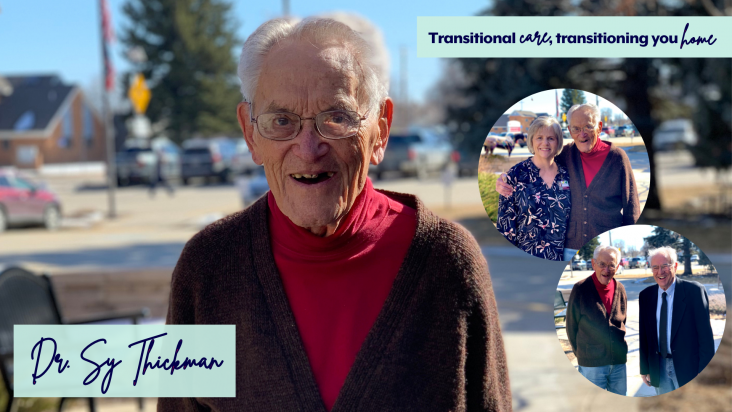In early January 2020, Dr. Sy Thickman stepped outside for his usual dog walk. Awaiting him was a thin layer of snow covering thick black ice; he slipped and fell as soon as he reached the street.
“I live with a very dear friend and yelled out to her,” Dr. Thickman remembered. “I was lying in the snow — I couldn’t move at all.”
His friend called for an ambulance, and within 15 minutes, Dr. Thickman arrived at Sheridan Memorial Hospital (SMH). X-rays revealed a fractured hip, and an orthopedic surgeon recommended an operation as soon as possible. The very next day, Thickman underwent a successful surgery and was transferred to the Transitional Care Unit (TCU).
The TCU is a recuperative and supportive place to heal following an injury, surgery, or serious illness. An expert team of nurses, doctors, and physical therapists manages patients’ transitions from daily intensive care to returning home.
“Some people may think that if they lie in bed all day and seem to be doing better medically, they’re ready to go home,” said Tiffany Sutton, a longtime physical therapist and the TCU Rehab Coordinator. “But you need (physical therapy) so you can go safely home — and stay home.”
Sutton and her team frequently have to put on a cheerful show to entice patients to participate in the all-important but often uncomfortable physical therapy. A physician since 1946, Dr. Thickman didn’t need to “drink the Kool Aid,” Sutton said.
And yet, this was his first hospitalization in his then 96 years. Dr. Thickman was admittedly worried, especially when he wasn’t able to move his injured leg at all for many days.
“You begin to think occasionally of potential consequences that would not be uncommon at this age,” he said. “There was a period of hospitalization early on in which I wondered if I was going to be able to return to a normal way of life.”
Enter: the TCU team. The nurses kept Dr. Thickman company, encouraged him to enjoy his meals in the community dining space with his fellow patients, and made him as comfortable as possible. The physical therapists worked on his mobility with their creative methods meant to mimic activities of daily living. The doctors monitored his progress. Everyone lifted his mood.
“I really had such comfort with the staff,” Thickman said. “They came every day, and it was fun to expect them. Never did I have any concern that wasn’t fulfilled. I felt in good hands, and I was able to — if you don’t mind the expression — ‘have fun with it.’”
The feeling was mutual.
“He was very fun — a joy to have,” Sutton said. “He shared his wisdom with us, which was incredibly wonderful of him. He would joke around with us and talk to us about how medicine has progressed. Thirty years ago, this (level of physical therapy) would never have happened.”
After two weeks of progressive improvement, Dr. Thickman could move with a walker with comfort, dress, and care for himself on his own. He was ready to be discharged. The transition home came with more prescribed physical therapy that tapered off over another two months.
Today, at age 98, Dr. Thickman is able to walk without the assistance of a cane or walker. He attributes his complete recovery to the “excellent care” at Sheridan Memorial Hospital.

